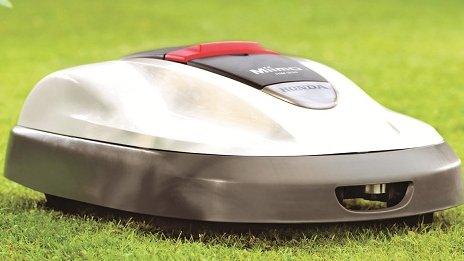Dyson robot vacuum cleaner revealed in Japan
- Published
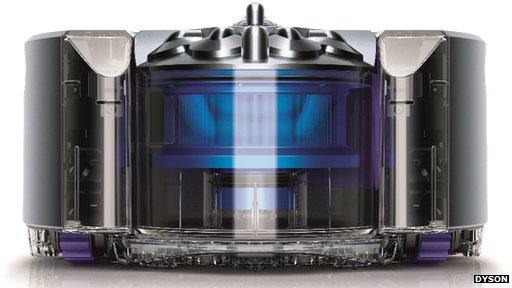
The Dyson 360 Eye is due for release 14 years after the company first revealed plans for a robot vacuum
British engineering company Dyson has announced its first robot vacuum cleaner at an event in Tokyo.
The Dyson 360 Eye, external joins a crowded market - Hoover, iRobot, Samsung, Neato and Vileda are among other manufacturers to sell such products.
But the Cotswolds-based company says its machine has more powerful suction and should be better at spotting dirt thanks to a "unique" camera system.
One expert said the claims sounded "quite compelling".
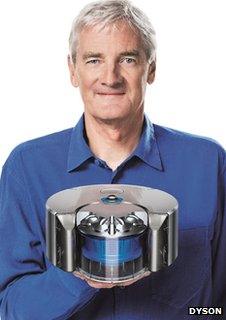
Sir James Dyson has opted to offer the machine to Japan first
"If it works as well as Dyson says it does, then this could be the robot vacuum cleaner to get mainstream market penetration, and not just be a niche product," said Will Findlater, who covers technology for Stuff magazine.
"Up until this point robot vacuums have been objects of geek affection.
"Certainly our experience of the competitors has been that they may do more on the robotics side of things than they do on the rather important business of cleaning your floors."
The machine is due to go on sale in Japan in the first three months of 2015, and then elsewhere later in the year.
Dyson previously showed off another robot vacuum cleaner - the DC06 - in 2001, but cancelled the project a few years later, in part because it would have cost consumers $3,000 (£1,820) or more.
It has yet to announce the price of the new model.
App-controlled cleaner
According to Dyson, most other robot vacuums use "weak, inefficient motors" in order to conserve battery life.
By contrast, it uses the same V2 digital motor found in its other handheld vacuum cleaners, and combines it with a brush bar that covers the full width of the machine, rather than relying on side sweepers.
"We've been developing for a number of years some of the smallest and most powerful digital motors available, and getting that right has enabled us to give the machine very powerful suction, so it can have a very high performance clean," Nick Schneider, a design engineer at the company, told the BBC.
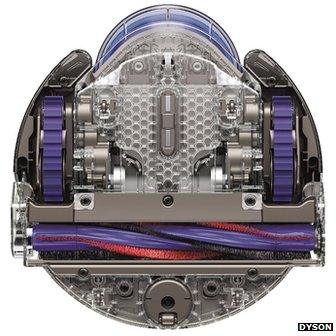
Dyson claims its full-width brush bar is more efficient than side sweeping brushes found on rival models
"In addition we've developed a vision system that enables the machine to be very methodical in its clean and not miss sections of floor space."
The vacuum is fitted with a panoramic lens, which sits on top of a camera that captures 360-degree views at 30 frames a second. This is combined with data from infrared sensors to let the machine's internal computer make sense of its position and surroundings.
Another innovation is the ability to schedule a clean remotely via an Android or iOS app.
Although other robot vacuums tend to have less suction power than human-directed vacuums, they make up for this by taking several passes at each room. So, it remains to be seen if Dyson's model actually leaves owners with cleaner homes.
Mr Schneider also acknowledged that the new machine remained less powerful than his company's plug-in-and-push models, meaning it would take longer to do a big clean. But he said it might still be the preferable option for families with a house layout that suited the automated tech.
"We're a way off in terms of comparing it to our corded machines," he said.
"But the benefit that it has is that you don't have to be there to use it.
"So, perhaps even if the performance isn't quite what you'd expect from a DC41 [full-size upright vacuum], the benefit of the convenience of just being able to set it whenever, and not having to worry about it, I think, is its real appeal."
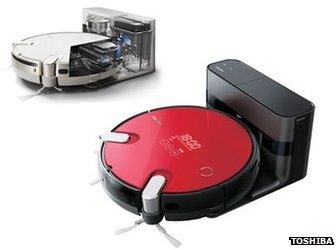
Toshiba's Torneo Robo empties its contents into its dock
Dyson's robot vacuum competitors are not resting on their laurels.
American firm Moneual has a new model that adds a wet mop to help clean hard floors.
Samsung's latest release allows owners to steer it to dirty spots by shining a laser pointer on the ground, which it then trundles towards.
LG's newest machine can send photos of its surroundings to its owner's smartphone, allowing them to check if its done its job properly and order another pass if not.
And Toshiba's Torneo Robo empties the dirt its gathers into its dock, allowing it to keep working without human intervention for extended periods of time.
Click's Lara Lewington looks at some of the latest robot vacuums to see if they could change the way we clean.
- Published18 February 2014
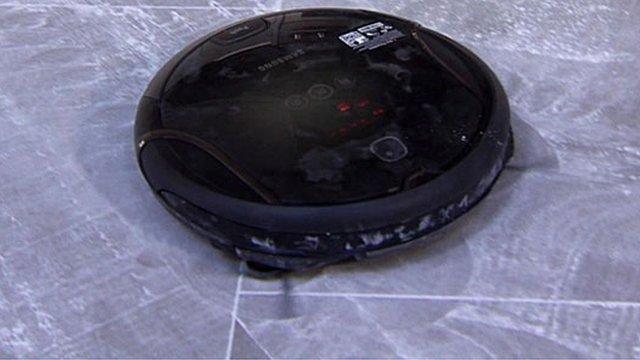
- Published9 February 2014
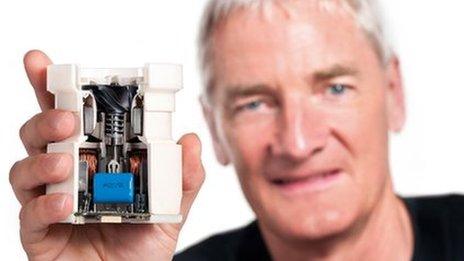
- Published1 November 2012
